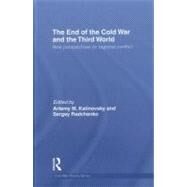The End of the Cold War and The Third World: New Perspectives on Regional Conflict
, by Kalinovsky; Artemy- ISBN: 9780415600545 | 0415600545
- Cover: Hardcover
- Copyright: 5/17/2011
This book examines the end of the Cold War in the Third World, and contributes to ongoing debates about regional conflicts, the role of great powers in the developing world, and the role of international actors.Relatively little has been written on the end of the Cold War in the Third World: in Asia, Africa, and Latin America. How did the great transformation of the world in the late 1980s affect regional conflicts and client relationships? Who "won" and who "lost" in the Third World and why do so many Cold War-era problems remain unresolved? This volume brings to light, for the first time, evidence from newly declassified archives in Russia, the United States, Eastern Europe, as well as other sources, and systematically explains, from the perspectives of both the superpowers and the Third World countries, what the end of bipolarity meant not only for the underdeveloped periphery, so long enmeshed in ideological, socio-political and military conflicts sponsored by Washington, Moscow or Beijing, but also for the broader patterns of international relations.In effect, the world witnessed, in the space of a few years several major events: Soviet retrenchment, the bankruptcy of socialist development and the triumph of market economics, the winding down of some regional conflicts and persistence of others, the growing prominence of the North-South divide, the rise of unipolarity and the stirrings of new regional blocs. As this book shows, many of these developments were rooted in tendencies that preceded the Cold War, continued during the Cold War, and, indeed, outlived the Cold War. The Cold War was central to the postwar history of the Third World; it was fought to some extent for, and in the name, of the Third World. This book offers a wealth of new historical records to explain and interpret the problems the Third World faces today.This book will be of much interest to students of the Cold War, war and conflict studies, third world and development studies, international history, and IR in general.







